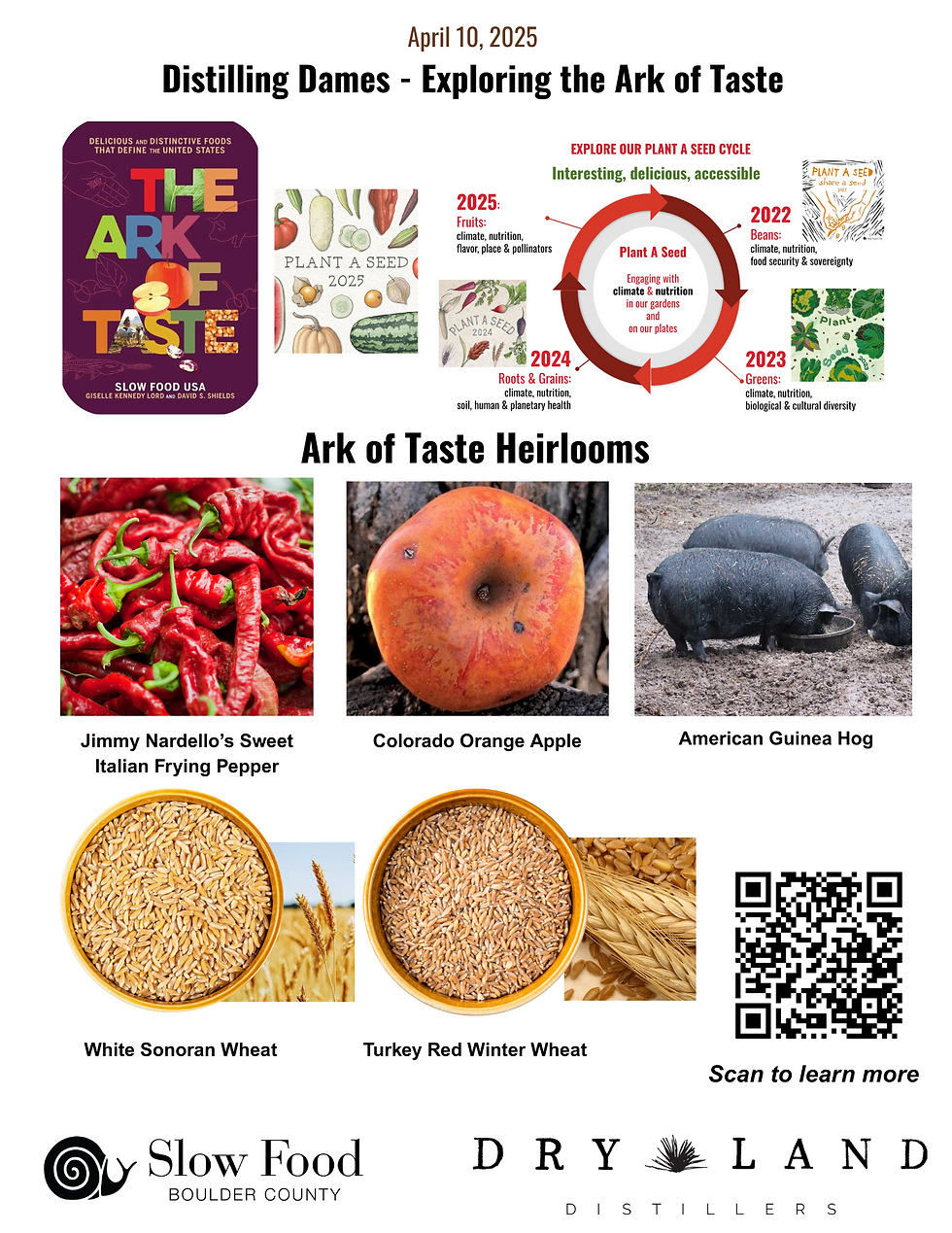Nibbles: Which Boulder restaurants truly walk the farm-to-table talk?
- John Lehndorff

- Nov 8, 2025
- 4 min read
By John Lehndorff - October 21. 2025
Slow Food’s Snail of Approval honors local spots living their sustainability values. Plus, a chocolate-croissant obsession at Dry Storage, Bobby Stuckey’s Julia Child Award and what’s cooking at Jax Fish House and Gold Hill Inn.

It is painful enough trying to get family or friends to choose a Boulder restaurant for dinner. Text threads spiral into debates about cuisines, food allergies and TikTok influencer recommendations.
Finding an eatery that also aligns with food values like sustainability, social responsibility and fairness can seem like an impossible dream.
Lots of local eateries brag about their “farm-to-table” fare and “farm-fresh” vegan and gluten-free dishes. But how many of them really support local farms? And how do those farms grow their crops and treat their workers?
The information that matters isn’t available in social media posts or Yelp and Google reviews.
The Slow Food Snail of Approval award is one answer to those questions.
“We were starved for a certification that actually had meaning. I’ve always wanted to find a way to overcome the greenwashing phenomenon,” says Mark DeRespinis, owner of Esoterra Culinary Garden. The [Boulder] farm has won the Snail of Approval award from both Slow Food Boulder County.

“The Snail certification questions are serious. How are you taking care of your soil? What are your regenerative practices? And how do you treat your workers?” DeRespinis says.
“It’s an extensive interview along with a site visit.”
The Snail of Approval award is a recognition program given to food and beverage establishments by local chapters of Slow Food, the international nonprofit organization. Slow Food’s simple mantra is: “Clean, fair food for all.”
Since 2022, Slow Food Boulder County has awarded the Snail of Approval certification to restaurants including Blackbelly, Basta and Corrida, and farms ranging from Masa Seed Foundation to Benevolence Orchard. Other current Snails include Hygiene’s Mountain Fountain, spirits producers (Dry Land Distillers), food makers (Pastificio) and bakeries (Dry Storage and Moxie Bread Co). See the complete list here.
Farmer Mark DeRespinis wanted to make sure that the Snail of Approval retained its credibility.
“I get calls from local Slow Food chapters because I grow mostly for restaurants. When they apply for the Snail, sometimes they put our name on their application,” he says.
“What I was seeing early on was that restaurants would use my farm’s name, but they would only order one or two herbs. It was a misrepresentation. If they got a Snail, it would water down this certification. We defined what is a reasonable percentage of your produce budget to devote to local farms and still call yourself ‘local,’” DeRespinis says.
“The Snail actually helps farms make a meaningful connection with restaurants that can appreciate what they are growing.”
One of those destinations is 24 Carrot [Bistro] in Erie, owned by Bianca Retzloff.
Retzloff jokes that she has been into Slow Food since birth.
“The Slow Food movement is something that is just ingrained in me as a human, and also growing up in the food world with my parents,” Retzloff says.
“Dad” is Mark Retzloff, a bona fide American natural foods pioneer and co-founder of Alfalfa’s Markets and CEO of Rudi’s Organic Bakery in Boulder.
Ten-year-old 24 Carrot was one of the first restaurants given the Snail of Approval in Boulder County when the program started. “To be recognized like this was more important to me than a James Beard Award or a Michelin star,” Retzloff says.
“It is about the actual principles of the business, not whether you’ve got the craziest new dish or the cleanest chef coats.”
The restaurateur points out that the Snail application includes questions about involvement in the community, whether staff get medical insurance, and sourcing.
“My family has a farm, and my brother has a flower farm. We get produce, flowers and sometimes meat from them and other farms. Then, we take our compost back to the farm,” Retzloff says. “It kind of goes full circle — farm to table to earth and back.”
According to Jodie Popma, board chair of Slow Food Boulder County, the Snail has one challenge facing it.
“The Snail of Approval is a trusted certification that shows a commitment to sustainability, but not enough people know about it yet,” Popma says.
The award lacks the name recognition and marketing push enjoyed by the James Beard, Michelin, Julia Child or Wine Spectator awards.
Surprisingly few businesses in Boulder County have applied for the Snail, despite the fact that the application is free.
“We do not charge, but we do encourage the businesses to become members of Slow Food. We think Slow Food is an on-ramp for people who want to understand the food system, and to be active in their community,” Popma says.
According to restaurateur Bianca Retzloff, consumers and businesses must put their money where their morals are.
“Look for the Snail. Support your locally owned businesses upholding practices that are good for the environment and the community,” she says. “Honestly, it’s not the most lucrative way to run your business. It is very much a sacrifice to continue to support my local farms and have my compost program and do all these things that may be cost inhibitive, but it’s the right way for us.”








Comments